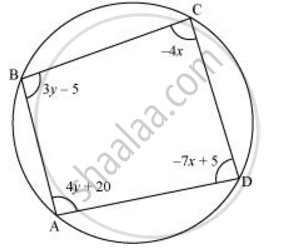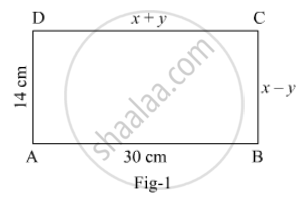Advertisements
Advertisements
Question
Solve the following pairs of equations by reducing them to a pair of linear equations
`1/(2x) + 1/(3y) = 2`
`1/(3x) + 1/(2y) = 13/6`
Solution
`1/(2x) + 1/(3y) = 2`
`1/(3x) + 1/(2y) = 13/6`
Let `1/x = p ` , then the equations changes as below:
`p/2 + q/3 = 2 ` ⇒ 3p + 2q -12 = 0 ... (i)
`p/3 + q/2 = 13/6` ⇒ 2p + 3q -13 = 0 ... (ii)
By cross-multiplication method, we get
`p/(-26-(-36)) = q/(-24-(-39)) = 1/(9-4)`
`p/10 = q/15 = 1/5`
`p/10 = 1/5 `
p = 2 and q = 3
1/x = 2 and 1/y = 3
Hence, `x = 1/2 `
APPEARS IN
RELATED QUESTIONS
Solve the following pairs of equations by reducing them to a pair of linear equations
`5/(x-1) + 1/y-2 = 2`
`6/(x-1) - 3/(y-2) = 1`
Solve the following pairs of equations by reducing them to a pair of linear equations
`(7x-2y)/(xy) = 5`
`(8x + 7y)/(xy) = 15`
A train covered a certain distance at a uniform speed. If the train would have been 10 km/h faster, it would have taken 2 hours less than the scheduled time. And if the train were slower by 10 km/h; it would have taken 3 hours more than the scheduled time. Find the distance covered by the train.
ABCD is a cyclic quadrilateral finds the angles of the cyclic quadrilateral.

In Fig. 1, ABCD is a rectangle. Find the value of x and y.

Find the value of following determinant.
`|(-1,7),(2,4)|`
A and B each have a certain number of mangoes. A says to B, "if you give 30 of your mangoes, I will have twice as many as left with you." B replies, "if you give me 10, I will have thrice as many as left with you." How many mangoes does each have?
A two-digit number is 3 more than 4 times the sum of its digits. If 8 is added to the number, the digits are reversed. Find the number.
The numerator of a fraction is 4 less than the denominator. If the numerator is decreased by 2 and denominator is increased by 1, then the denominator is eight times the numerator. Find the fraction.
A father is three times as old as his son. After twelve years, his age will be twice as that of his son then. Find the their present ages.
